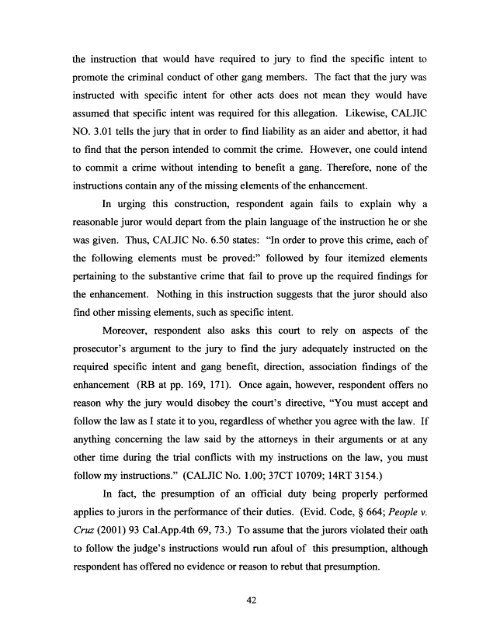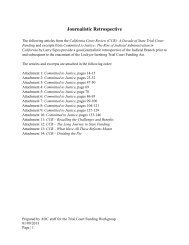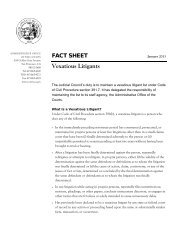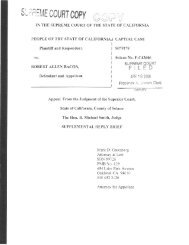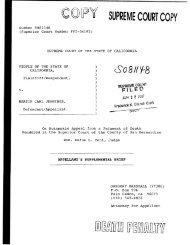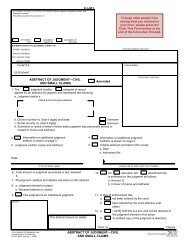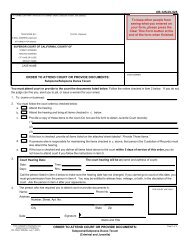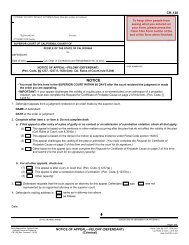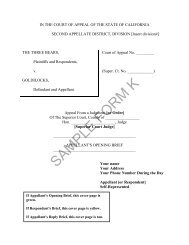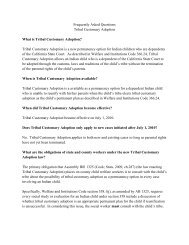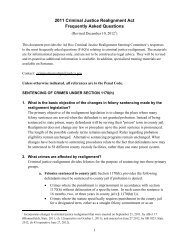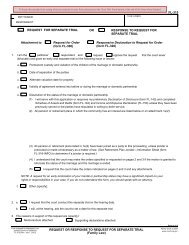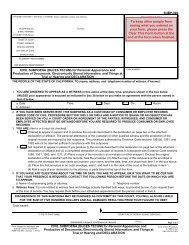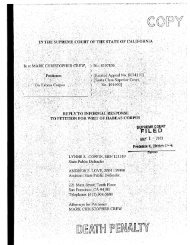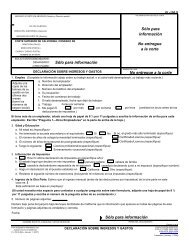Appellant, William Satele, Reply Brief - California Courts - State of ...
Appellant, William Satele, Reply Brief - California Courts - State of ...
Appellant, William Satele, Reply Brief - California Courts - State of ...
You also want an ePaper? Increase the reach of your titles
YUMPU automatically turns print PDFs into web optimized ePapers that Google loves.
the instruction that would have required to jury to find the specific intent to<br />
promote the criminal conduct <strong>of</strong> other gang members. The fact that the jury was<br />
instructed with specific intent for other acts does not mean they would have<br />
assumed that specific intent was required for this allegation. Likewise, CALJIC<br />
NO. 3.01 tells the jury that in order to find liability as an aider and abettor, it had<br />
to find that the person intended to commit the crime. However, one could intend<br />
to commit a crime without intending to benefit a gang. Therefore, none <strong>of</strong> the<br />
instructions contain any <strong>of</strong>the missing elements <strong>of</strong>the enhancement.<br />
In urging this construction, respondent again fails to explain why a<br />
reasonable juror would depart from the plain language <strong>of</strong>the instruction he or she<br />
was given. Thus, CALJIC No. 6.50 states: "In order to prove this crime, each <strong>of</strong><br />
the following elements must be proved:" followed by four itemized elements<br />
pertaining to the substantive crime that fail to prove up the required findings for<br />
the enhancement. Nothing in this instruction suggests that the juror should also<br />
find other missing elements, such as specific intent.<br />
Moreover, respondent also asks this court to rely on aspects <strong>of</strong> the<br />
prosecutor's argument to the jury to fmd the jury adequately instructed on the<br />
required specific intent and gang benefit, direction, association findings <strong>of</strong> the<br />
enhancement (RB at pp. 169, 171). Once again, however, respondent <strong>of</strong>fers no<br />
reason why the jury would disobey the court's directive, "You must accept and<br />
follow the law as I state it to you, regardless <strong>of</strong>whether you agree with the law. If<br />
anything concerning the law said by the attorneys in their arguments or at any<br />
other time during the trial conflicts with my instructions on the law, you must<br />
follow my instructions." (CALJIC No. 1.00; 37CT 10709; 14RT 3154.)<br />
In fact, the presumption <strong>of</strong> an <strong>of</strong>ficial duty being properly performed<br />
applies to jurors in the performance <strong>of</strong> their duties. (Evid. Code, § 664; People v.<br />
Cruz (2001) 93 Cal.App.4th 69, 73.) To assume that the jurors violated their oath<br />
to follow the judge's instructions would run afoul <strong>of</strong> this presumption, although<br />
respondent has <strong>of</strong>fered no evidence or reason to rebut that presumption.<br />
42


